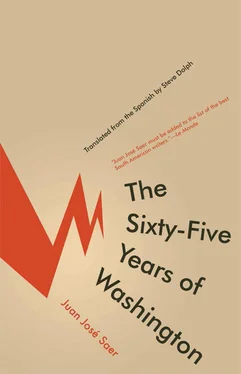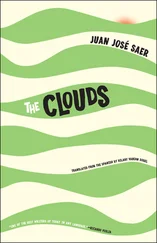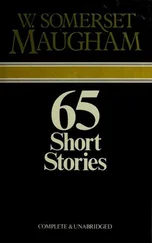Juan José Saer - The Sixty-Five Years of Washington
Здесь есть возможность читать онлайн «Juan José Saer - The Sixty-Five Years of Washington» весь текст электронной книги совершенно бесплатно (целиком полную версию без сокращений). В некоторых случаях можно слушать аудио, скачать через торрент в формате fb2 и присутствует краткое содержание. Год выпуска: 2010, Издательство: Open Letter, Жанр: Современная проза, на английском языке. Описание произведения, (предисловие) а так же отзывы посетителей доступны на портале библиотеки ЛибКат.
- Название:The Sixty-Five Years of Washington
- Автор:
- Издательство:Open Letter
- Жанр:
- Год:2010
- ISBN:нет данных
- Рейтинг книги:3 / 5. Голосов: 1
-
Избранное:Добавить в избранное
- Отзывы:
-
Ваша оценка:
- 60
- 1
- 2
- 3
- 4
- 5
The Sixty-Five Years of Washington: краткое содержание, описание и аннотация
Предлагаем к чтению аннотацию, описание, краткое содержание или предисловие (зависит от того, что написал сам автор книги «The Sixty-Five Years of Washington»). Если вы не нашли необходимую информацию о книге — напишите в комментариях, мы постараемся отыскать её.
The Sixty-Five Years of Washington — читать онлайн бесплатно полную книгу (весь текст) целиком
Ниже представлен текст книги, разбитый по страницам. Система сохранения места последней прочитанной страницы, позволяет с удобством читать онлайн бесплатно книгу «The Sixty-Five Years of Washington», без необходимости каждый раз заново искать на чём Вы остановились. Поставьте закладку, и сможете в любой момент перейти на страницу, на которой закончили чтение.
Интервал:
Закладка:
— Washington’s legendary four lectures on the Indians in Colastiné, says the Mathematician.
Leto has heard about them — in a fragmentary way, of course, like, in a similar way, everything relating to Washington. He has been working on them — Location, Lineage, Language, Logic — for four or five years, in a fragmentary way, no? for example, that Washington, who Leto, before moving from Rosario, had never heard of, in fact, that Washington, for example, has been in prison several times, mostly in the twenties and thirties, and that, at the end of the forties, spent time in an asylum, that he was married twice and both times separated, that his daughter married a doctor and has lived in Córdoba for a few years, that the house in Rincón Norte, the land at least, was inherited from his father, a pharmacist in Emilia, with whom he had not spoken from 1912 until his death (his father’s, no?), that Washington lives on a disability pension they gave him when he left the asylum and on translations, etc., etc. — and a mess of other things he has happened to fish out of conversations, things he has heard him tell to Tomatis, to Barco, to César Rey, to the twins, et cetera .
Assenting without turning to look at the Mathematician, Leto nods his head. They are now even with the record store, on the opposite sidewalk, and when they pass in front they can hear with greater clarity the music that, like them, has been advancing up the straight street, via the melody’s more intricate path, to the momentary encounter. But the Mathematician’s outward indifference toward it is so complete that Leto feels a rapid irritation, a kind of rebellion, as if, with that subtle indifference, the Mathematician defrauds him — which in a sense is true, because when he saw him absorbed in the music, Leto felt a confused and somewhat problematic admiration for him. Unaware of any external error, the Mathematician continues:
— But that’s another story, he says.
The lectures, no? In the calm night in Rincón Norte, in the illuminated, silent study where the smoke of the forgotten cigarette in the notch on the ashtray rises, quiet and regular, toward the lamp, Washington reads, calmly, the book open over the table. And this is when the three mosquitos make their appearance.
Here the Mathematician affects an ostentatious and satisfied pause, jerking his head toward Leto who, to punish him for his flippancy a second ago, decides to not register the effect, abstaining from turning his gaze from the fixed point that he is staring at many meters ahead on the straight sidewalk, and the slightly theatrical smile that had started to stretch across the Mathematician’s face is erased, and an indescribable, paled expression, of panic and sadness, appears instead. But just as the decision is made, for lack of resolve or because he disapproved fundamentally of the pettiness in his attitude, Leto gives up and turns his head, assuming an intrigued expression no less theatrical than the Mathematician’s satisfied pause. The Mathematician revives. Once more the fog of The Incident, in brief, faint, and successive waves, had overcome him, a fog that the pale expression of panic and sadness, which has just passed, unnoticed by Leto, has been only the most external manifestation, like the lamps in Entre Ríos that, they say, seemed to vibrate the night of the San Juan earthquake. The waves retreat, and in the Mathematician’s imagination, Washington, absorbed in his reading, hears the triplicate buzzing much later than when the mosquitos started flying around the room, over his head, somewhere between the table and the ceiling — and this, of course, according to Botón, and according to Botón according to Washington.
Now, almost every door on the street, generally sitting open between two windows, belongs to a business. On the opposite sidewalk, for example, after the record store they’ve just passed, diminishing the music’s intensity, there’s a fabric store, a furniture store, a place selling Lux electrical appliances, the women’s shoe store Chez Juanita. On the sidewalk where they walk, Leto and the Mathematician successively pass an American diner, dark and dingy in spite of its plastic stools and its multicolor formica counter; a flower shop; one selling fancy pastries; a cigarette store where an older man behind the window is putting on his glasses to study, with painstaking sincerity, his lottery ticket. At every business, from the upper part of the façade, between the first and second floors, the neon signs extend over the street, vertically or horizontally, in different directions and, though they are turned off, form, to put a word to it, a sort of canopy that covers, as far as you can see from a certain height, the central avenue, or like a multitude of rigid standards, in a tight formation that, if they belonged to an army, would intimidate the enemy with their immobility, their quantity, and their variety — each one, like the music from the record store, advertising itself tautologically, repeating, a little higher, emblematically, the message already expressed in a direct and precise form on the windows, in the same way that some religions, as if the presence of a creator were not evident in the creation itself, need to make use, to demonstrate his existence, of some sign of his existence that’s separate from the objects he created.
For statistical reasons, more so than actual popularity, the Mathematician is every so often obliged to greet, whether with a quick gesture, a nod of his head, or in some terse, conventional way, the acquaintances he passes — statistics that on the one hand are disadvantageous to Leto since he has only lived in the city a short while and knows considerably fewer people than the Mathematician, a constituent ab origine , and that on the other hand, for the last few blocks, considering the gradual and systematic inflation to the number of pedestrians as they approach the city center, increase in the Mathematician’s favor the chances of bumping into an acquaintance. In fact, in only purely quantifiable terms is he favored, because in aesthetic, political, emotional, or psychological terms, so to speak, no? and on moral — as they say, and if you like, and speaking ill and in haste — and existential levels, as I was saying earlier, the Mathematician loathes a good portion of his fellow citizens, especially those of his own class— the bloodlust bourgeoisie —for whom he has cultivated, from the age of eight or nine, a concentrated contempt and inexplicable hatred. In spite of their liberal beliefs, his parents are friendly with political bosses and landowners who, likewise, in deference to their aristocratic name and, more than anything, to the expanse of land surrounding Tostado, tolerate their liberal humanism, the way they would the epileptics or pederasts in their class. His brother, Leandro (because. . no?), several years older than him, for whom, according to the Mathematician, moral reflexes seem nonexistent and money and social status are the a priori principles of his ontology , has been grooming himself as a landowner since childhood, so much so that even his own parents, despite the genuine affection they feel for him, show a certain prudence when he is around. Leandro, for his part, treats his parents like communists and bohemians. And between the Mathematician and his brother, after several grim altercations, relations are limited, when they’re with the family, to an exchange of cold monosyllables thick with innuendo. In spite of this — what a gentleman! — Leandro doesn’t miss a single important family event; he never forgets to call his mother every other day, according to custom; and you had to see him on the tennis court, well-groomed and tanned, fairly conceding each of his opponent’s points only to steamroll him in the second set. And, using him as an example, you could never derive a single generalization about human nature, because it’s difficult to determine if, apart from his real estate and holdings and evenings at the Jockey Club and the Rotary, he possesses a single genuine human trait suitable to motivating a generalization —he said once to Tomatis, with the characteristic humor that likes to feign surprise and false neutrality.
Читать дальшеИнтервал:
Закладка:
Похожие книги на «The Sixty-Five Years of Washington»
Представляем Вашему вниманию похожие книги на «The Sixty-Five Years of Washington» списком для выбора. Мы отобрали схожую по названию и смыслу литературу в надежде предоставить читателям больше вариантов отыскать новые, интересные, ещё непрочитанные произведения.
Обсуждение, отзывы о книге «The Sixty-Five Years of Washington» и просто собственные мнения читателей. Оставьте ваши комментарии, напишите, что Вы думаете о произведении, его смысле или главных героях. Укажите что конкретно понравилось, а что нет, и почему Вы так считаете.












